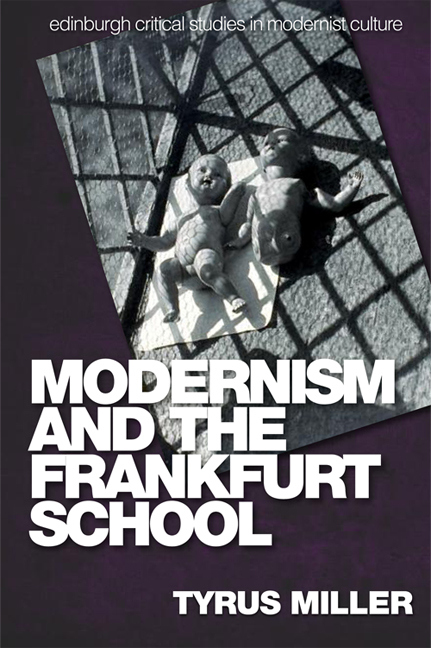5 - The New Wave: Modernism and Modernity in the Later Frankfurt School
Summary
The works of the early Frankfurt School thinkers discussed in the preceding chapters – Benjamin, Adorno, and Marcuse – have made an enduring impact on aesthetics and criticism across the arts, and, as I have argued, are particularly adapted to enrich our understanding of the twentieth-century modernist and avant-garde manifestations. They have been taken up repeatedly, debated, and reinterpreted in light of various emerging critical tendencies: the arguments around cultural politicization and media raised by the New Left and the student movement; cultural studies’ reappraisal of popular and mass culture; the postmodernism debates of the 1980s and ‘90s; the “end of utopia” arguments that accompanied the collapse of actually existing socialism in 1989–91; the renewal of interest in the “culture industry” hypothesis with the unprecedented global media concentration and extension in the digital age; and so on. Moreover, these discussions have been enriched by an increasing availability of previously unedited, uncollected, or untranslated works, especially by Benjamin (the Harvard University Press collection of his writings and of the Arcades Project in English translation) and Adorno (both new volumes added to his Gesammelte Schriften and new translations of published works, lectures, and letters). New Modernist Studies in the United States and UK, represented by such key journals as Modernism / Modernity and Modernist Cultures, have been strongly influenced by this ongoing, steadily expanding appropriation of Frankfurt School thought by scholars of modernism.
In this chapter, however, I cannot even briefly survey this larger and longer-term reception and reinterpretation of the early Frankfurt School. I will instead focus on three German intellectuals who can be seen as direct heirs of the early Frankfurt School: the literary critic Peter B ürger, the philosopher Albrecht Wellmer, and the novelist, filmmaker, and cultural theorist Alexander Kluge. I have deliberately chosen these three examples of intellectuals working in heterogeneous, if interrelated areas of cultural production to suggest a range of perspectives and the critical reach that the Frankfurt School's interdisciplinary project has continued to have in later generations. Though I attempt to hint at the larger context of their thought and work, I will need to further restrict myself to discussing their specific intervention into the question of modernism and the avant-garde, via their critical reevaluations of the work of Benjamin, Adorno, and/or Marcuse.
- Type
- Chapter
- Information
- Modernism and the Frankfurt School , pp. 147 - 176Publisher: Edinburgh University PressPrint publication year: 2014



